| Listing 1 - 10 of 105 | << page >> |
Sort by
|
Book
ISBN: 9789523690806 Year: 2022 Publisher: Helsinki : Helsinki University Press,
Abstract | Keywords | Export | Availability | Bookmark
 Loading...
Loading...Choose an application
- Reference Manager
- EndNote
- RefWorks (Direct export to RefWorks)
Finnish Settler Colonialism in North America reinterprets Finnish experiences in North America by connecting them to the transnational processes of settler colonial conquest, far-settlement, elimination of natives, and capture of terrestrial spaces. Rather than merely exploring whether the idea of Finns as a different kind of immigrant is a myth, this book challenges it in many ways. It offers an analysis of the ways in which this myth manifests itself, why it has been upheld to this day, and most importantly how it contributes to settler colonialism in North America and beyond. The authors in this volume apply multidisciplinary perspectives in revealing the various levels of Finnish involvement in settler colonialism. In their chapters, authors seek to understand the experiences and representations of Finns in North American spatial projects, in territorial expansion and integration, and visions of power. They do so by analyzing how Finns reinvented their identities and acted as settlers, participated in the production of settler colonial narratives, as well as benefitted and took advantage of settler colonial structures. Finnish Settler Colonialism in North America aims to challenge traditional histories of Finnish migration, in which Finns have typically been viewed almost in isolation from the broader American context, not to mention colonialism. The book examines the diversity of roles, experiences, and narrations of and by Finns in the histories of North America by employing the settler colonial analytical framework.
Colonists. --- Finland --- Emigration and immigration. --- Settlers (Colonists) --- Persons

ISBN: 0869610902 Year: 1977 Publisher: Cape Town Balkema
Abstract | Keywords | Export | Availability | Bookmark
 Loading...
Loading...Choose an application
- Reference Manager
- EndNote
- RefWorks (Direct export to RefWorks)
HIS History & Biographies --- history and biographies --- Pioneers --- First settlers --- Settlers, First --- Biography --- South Africa --- Africa, South --- Biography. --- Persons --- Frontier and pioneer life
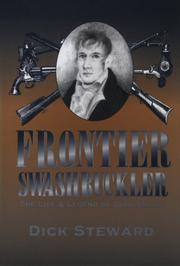
ISBN: 0826263437 9780826263438 9780826212481 0826212484 Year: 2000 Publisher: Columbia University of Missouri Press
Abstract | Keywords | Export | Availability | Bookmark
 Loading...
Loading...Choose an application
- Reference Manager
- EndNote
- RefWorks (Direct export to RefWorks)
Pioneers --- Businessmen --- Frontier and pioneer life --- Business men --- Businesspeople --- First settlers --- Settlers, First --- Persons --- Smith T, John, --- T, John Smith, --- Missouri --- Tennessee
Book
ISBN: 1280466278 9786610466276 0803253893 9780803253896 9781280466274 6610466270 Year: 2005 Publisher: Lincoln, Neb. University of Nebraska Press
Abstract | Keywords | Export | Availability | Bookmark
 Loading...
Loading...Choose an application
- Reference Manager
- EndNote
- RefWorks (Direct export to RefWorks)
In this second volume of interviews conducted by Nebraska judge Eli S. Ricker, he focuses on white eyewitnesses and participants in the occupying and settling of the American West in the nineteenth century. In the first decade of the twentieth century, as the Old West became increasingly distant and romanticized in popular consciousness, Eli S. Ricker (1842–1926) began interviewing those who had experienced it firsthand, hoping to write a multivolume series about its last days, centering on the conflicts between Natives and outsiders. For years Ricker traveled across the northern Plains, gathering information on and off reservations, in winter and in summer. Judge Ricker never wrote his book, but his interviews are priceless sources of information about that time and place, and they offer more balanced perspectives on events than were accepted at the time. Richard E. Jensen brings together all of Ricker’s interviews with those men and women who came to the American West from elsewhere—settlers, homesteaders, and veterans. These interviews shed light on such key events as the massacre at Wounded Knee, the Little Bighorn battle, Beecher Island, Lightning Creek, the Mormon cow incident, and the Washita massacre. Also of interest are glimpses of everyday life at different agencies, including Pine Ridge, Yellow Medicine, and Fort Sill School; brief though revealing memoirs; and snapshots of cattle drives, conflicts with Natives, and the construction of the Union Pacific Railroad.--
Indians of North America --- Historiography. --- Pioneers --- Ricker, Eli Seavey, --- Relations with Indians. --- First settlers --- Settlers, First --- Persons --- Frontier and pioneer life
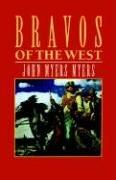
ISBN: 0585266077 9780585266077 0803282222 9780803282223 0803282222 Year: 1995 Publisher: Lincoln : University of Nebraska Press,
Abstract | Keywords | Export | Availability | Bookmark
 Loading...
Loading...Choose an application
- Reference Manager
- EndNote
- RefWorks (Direct export to RefWorks)
Pioneers --- Regions & Countries - Americas --- History & Archaeology --- United States Local History --- First settlers --- Settlers, First --- Persons --- Frontier and pioneer life --- West (U.S.) --- History.
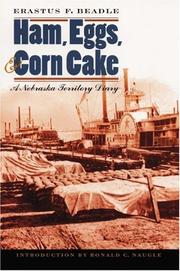
ISBN: 1280465751 9786610465750 0803202458 9780803202450 080326187X 9780803261877 9781280465758 6610465754 Year: 2001 Publisher: Lincoln University of Nebraska Press
Abstract | Keywords | Export | Availability | Bookmark
 Loading...
Loading...Choose an application
- Reference Manager
- EndNote
- RefWorks (Direct export to RefWorks)
Frontier and pioneer life --- Pioneers --- First settlers --- Settlers, First --- Persons --- Beadle, Erastus Flavel, --- Travel --- Omaha Region (Neb.) --- Nebraska --- State of Nebraska --- Nebraska Territory --- Social life and customs
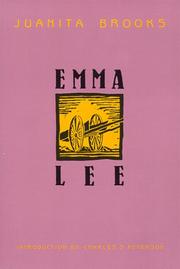
ISBN: 1457180650 1283523744 9786613836199 0874213924 9780874213928 0874211212 9780874211214 Year: 1984 Publisher: Logan, Utah Utah State University Press
Abstract | Keywords | Export | Availability | Bookmark
 Loading...
Loading...Choose an application
- Reference Manager
- EndNote
- RefWorks (Direct export to RefWorks)
Now in its eighth printing, Emma Lee is the classic biography of one of John D. Lee's plural wives. Emma experienced the best and worst of polygamy and came as near to the Mountain Meadows Massacre as anyone could without participating firsthand.
Pioneers --- Mormon pioneers --- First settlers --- Settlers, First --- Persons --- Frontier and pioneer life --- Biography. --- Lee, Emma, --- Utah --- Batchelor, Emma, --- French, Emma, --- Latter Day Saint pioneers
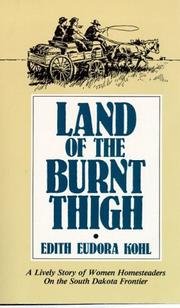
ISBN: 0873516788 0873511999 Year: 2009 Publisher: LaVergne : Minnesota Historical Society Press,
Abstract | Keywords | Export | Availability | Bookmark
 Loading...
Loading...Choose an application
- Reference Manager
- EndNote
- RefWorks (Direct export to RefWorks)
Land of the Burnt Thigh, first published in 1938,is one of the best accounts. Edith Eudora Ammons and her sister Ida Mary moved to central South Dakota in 1907 to try homesteading near the "Land of the Burnt Thigh"--The Lower Brule INdian Reservation. There these two young women, both in their twenties and "timid as mice," found a community of homesteaders (including several other single women) who were eager to help them succeed at what looked to be impossible: living in a tiny tarpaper shack on 160 waterless, sunbaked, and snowblasted acres for eight months, until they could "prove up" the claim.
Pioneers --- Farm life --- Frontier and pioneer life --- First settlers --- Settlers, First --- Persons --- Rural life --- Country life --- Biography. --- History. --- Kohl, Edith Eudora, --- South Dakota --- State of South Dakota --- Dakota Territory --- Social life and customs.
Book
ISBN: 1926836553 192683657X 1926836561 1299394973 9781926836553 9781926836560 9781926836553 9781926836577 9781299394971 Year: 2013 Publisher: Edmonton, AB
Abstract | Keywords | Export | Availability | Bookmark
 Loading...
Loading...Choose an application
- Reference Manager
- EndNote
- RefWorks (Direct export to RefWorks)
In 1910, young Pierre Maturié bid farewell to his comfortable bourgeois existence in rural France and travelled to northern Alberta in search of independence, adventure, and newfound prosperity. Some sixty years later, he wrote of the four years he spent in Canada before he returned to France in 1914 to fight in the First World War. Like that of so many youthful pioneers, his story is one of adventure and hardship—perilous journeys, railroad construction in the Rockies, panning for gold in swift-flowing streams, transporting goods for the Hudson’s Bay Company along the Athabasca River. Blessed with the rare gift of a natural storyteller, Maturié conveys his abiding nostalgia for a country he loved deeply yet ultimately had to abandon.Maturié’s memoir, Man Proposes, God Disposes, appeared in France in 1972, to a warm reception. Now, in the deft and marvellously empathetic translation of Vivien Bosley, it is at long last available in English. As a portrait of pioneer life in northern Alberta, as a window onto the French experience in Canada, and, above all, as an irresistible story—it will continue to find a place in the hearts of readers for years to come.
Frontier and pioneer life --- Pioneers --- Maturié, Pierre. --- Athabasca River Region (Alta.) --- First settlers --- Settlers, First --- Persons --- Border life --- Homesteading --- Pioneer life --- Adventure and adventurers --- Manners and customs --- History --- memoir --- francophone --- homesteading --- Northern Alberta
Book
ISBN: 128046626X 9786610466269 0803253885 9780803253889 Year: 2005 Publisher: Lincoln University of Nebraska Press
Abstract | Keywords | Export | Availability | Bookmark
 Loading...
Loading...Choose an application
- Reference Manager
- EndNote
- RefWorks (Direct export to RefWorks)
The valuable interviews conducted by Nebraska judge Eli S. Ricker with Indian eyewitnesses to the Wounded Knee massacre, the Little Big Horn battle, the Grattan incident, and other events and personages of the Old West are finally made widely available in this long-awaited volume. In the first decade of the twentieth century, as the Old West became increasingly distant and romanticized in popular consciousness, Eli S. Ricker (1843–1926) began interviewing those who had experienced it firsthand, hoping to write a multi-volume series about its last days. Among the many individuals he interviewed were American Indians, mostly Sioux, who spoke extensively about a range of subjects, some with the help of an interpreter. For years Ricker traveled across the northern Plains, determinedly gathering information on and off reservations, in winter and in summer. Judge Ricker never wrote his book, but his interviews are priceless sources of information about the Old West that offer more balanced perspectives on events than were accepted at the time. Richard E. Jensen brings together all of Ricker’s interviews with American Indians, annotating the conversations and offering an extensive introduction that sets forth important information about Ricker, his research, and the editorial methodology guiding the present volume.--
Indians of North America --- Historiography. --- Ricker, Eli Seavey, --- Relations with Indians. --- Pioneers --- European Americans --- Frontier and pioneer life --- History. --- Border life --- Homesteading --- Pioneer life --- Adventure and adventurers --- Manners and customs --- Ethnology --- Europeans --- White people --- First settlers --- Settlers, First --- Persons --- History
| Listing 1 - 10 of 105 | << page >> |
Sort by
|

 Search
Search Feedback
Feedback About UniCat
About UniCat  Help
Help News
News